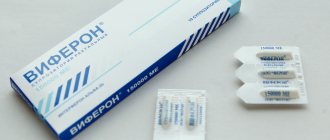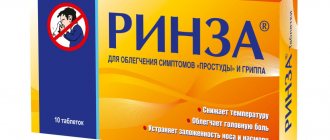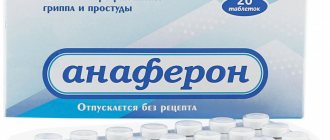Composition of the drug Sinupret
The doctor observing the patient may prescribe the drug Sinupret. This is a combination medicine based on medicinal herbs.
Among the effects that Sinupret has are mucolytic, expectorant and anti-inflammatory. It is often prescribed for colds, sinusitis, sinusitis and sinusitis.
You can find Sinupret in the pharmacy in the form of tablets, oral drops and syrup. Sinupret tablets are prescribed to adults and children as a complex therapy if sinusitis is characterized by the presence of a viscous secretion. Drops and syrup are indicated for children and those who cannot take pills.
Plant components (verbena, primrose, sorrel, black elderberry, gentiana) are highly productive and work well together. This means that they effectively cope with swelling of the mucous membrane and nasal congestion, regulate secretions, normalize sinus ventilation, and stimulate drainage. Thus, Sinupret has a secretomotor, secretolytic and anti-inflammatory effect.
Since Sinupret is based on medicinal herbs, let's look at what effect you can expect from each of them.
Verbena normalizes metabolic processes. It works as a tonic, analgesic, and anti-inflammatory agent. As part of Sinupret, Verbena acts as a component that dilutes viscous secretions, relieves allergic reactions and works as an antispasmodic.
Primrose is included as a sedative, expectorant and antispasmodic. Primrose stimulates secretion, which means that phlegm is eliminated faster.
Sorrel in Sinupret to provide anti-allergic, wound-healing, hemostatic, antiseptic and anti-inflammatory effects.
Black elderberry eliminates swelling of the nasal mucosa. It has a disinfectant and, accordingly, anti-inflammatory effect.
Sinupret copes well with chronic rhinitis
Thus, the complex of herbs in the Sinupret medicine:
- reduces the viscosity of sputum;
- facilitates the process of sputum discharge;
- effectively clears the sinuses of secretions;
- eliminates bronchospasm;
- normalizes the protective function of the respiratory tract epithelium;
- acts as an antiviral and anti-inflammatory agent.
And Sinupret, due to its combined nature, enhances the effectiveness of antibiotic treatment.
Sinupret's plant base provides another important advantage. The drug acts gently, does not cause addiction and has a small list of adverse reactions of the body. Sinupret improves the body's resistance to viruses and bacteria, and is therefore especially recommended for patients with weakened immune systems.
Compound
Sinupret contains mainly natural ingredients. Its composition, depending on the dosage form, includes extracts of primrose, gentian, sorrel, elderberry and verbena.
Gelatin, sorbitol, starch, stearic acid and some other substances are used as auxiliary components contained in the tablets.
The drop form of the drug contains 20 percent ethyl alcohol, and the syrup contains 8 percent ethanol, sucrose, cherry flavor and maltitol.
Contraindications
Although Sinupret is a herbal drug, it has a list of contraindications, like any drug. Sinupret drops and syrup are contraindicated for:
- hypersensitivity and intolerance to the component(s) of the drug;
- epilepsy;
- liver diseases;
- brain diseases;
- alcoholism;
- pregnancy, breastfeeding;
- age up to 2 years.
Sinupret in pill form should not be used for:
- sucrase-isomaltase deficiency;
- intolerance to galactose, fructose;
- lactase deficiency;
- disturbances in the absorption of glucose-galactose.
How to take Sinupret?
The dosage, duration of treatment or prescription of another drug is determined by the attending physician. Only he can adequately assess the course of the disease and the necessary measures. The therapeutic course of Sinupret is usually 7-14 days. If there is no improvement, you should consult a doctor for advice and adjustment of the prescription.
How to take Sinupret correctly
Dragee Sinupret:
- Adults and children over 12 years old: 2 tablets 3 times a day.
- Children 6-12 years old: 1 tablet 3 times a day.
Sinupret drops:
- Adults: 50 drops of medication 3 times a day.
- Children over 10 years old: no more than 25 drops 3 times a day.
Sinupret syrup:
- Adults and children over 12 years old: 7 ml of syrup 3 times a day.
- Children 6-11 years old: 3.5 ml of syrup 3 times a day.
- Children 2-5 years old: 2 ml of medication 3 times a day. The syrup must be diluted in 1 tbsp. l. boiled water.
The drops are taken orally and do not need to be instilled. Moreover, adult patients drink the medicine undiluted, while for children it is necessary to dilute the drops in boiled water.
Sinupret® tablets
APPROVED Order of the Ministry of Health of Ukraine March 31, 2016 No. 288 Registration Certificate No. UA/4373/02/01
INSTRUCTIONS for medical use of the drug SINUPRET ® (SINUPRET ® )
Composition of the medicinal product: active ingredients: 1 tablet contains dried medicinal plants in powder form:
| gentian root (Radix Gentianae) | 6 mg |
| primrose flowers with a calyx (Flores Рrimulae сum Сalyсіbus) | 18 mg |
| sorrel herb (Herba Rumis) | 18 mg |
| elderberry flowers (Flores Sambusi) | 18 mg |
| Verbena herbs (Nerba Verbenae) | 18 mg |
excipients: calcium carbonate (E 170), ricin oil, colloidal anhydrous silicon dioxide, acrylate copolymer, gelatin, glucose solution, lactose monohydrate, light magnesium oxide, corn starch, dextrin, montan glycol wax, potato starch, povidone, purified water, shellac, sorbitol, (E 420), stearic acid, sucrose, talc, titanium dioxide (E 171), anhydrous sodium carbonate, quinoline yellow (E 104), indigo carmine (E 132).
Dosage form. Film-coated tablets. Round, biconvex tablets, coated with a green color with a smooth surface.
Manufacturer's name and location. Bionorica SE, Kerchensteinerstrasse 11-15, 92318 Neumarkt, Germany.
Pharmacotherapeutic group. Combined drugs that are used for coughs and colds. ATC code R05X.
The components that make up the herbal medicine have complex activity, which is manifested in secretolytic action, decongestant, anti-inflammatory, immunostimulating and antiviral effects.
The active components of Sinupret® inhibit the reproduction of various respiratory viruses, such as influenza A virus, parainfluenza and RSV (respiratory syncytial viruses).
Under the influence of the drug, secretion is regulated and tissue swelling is reduced. Drainage and ventilation of the paranasal sinuses are restored, nasal congestion is eliminated, and the protective function of the respiratory tract epithelium is normalized. The effectiveness of antibiotic therapy increases.
Indications for use. Acute and chronic inflammation of the paranasal sinuses.
Contraindications. Increased individual sensitivity to any of the active or auxiliary substances of the drug, as well as increased sensitivity to other types of primrose.
Safety precautions for use.
The drug should not be taken by patients with hereditary intolerance to fructose, galactose, lactase deficiency, glucose-galactose malabsorption or sucrase-isomaltase deficiency.
Note for diabetic patients. 1 film-coated tablet contains an average of 0.01 bread units.
If symptoms of the disease do not disappear after 7-14 days of treatment or recur periodically, you should consult a doctor.
Special instructions.
Use during pregnancy or breastfeeding. During pregnancy or breastfeeding, the drug can be used after consultation with a doctor in cases where the benefit of use outweighs the potential risk to the fetus/child.
The ability to influence the reaction speed when driving a vehicle or a robot with other mechanisms. No special precautions are required.
Children. For the treatment of preschool children (under 6 years old), who are prescribed smaller doses, I use Sinupret in the form of drops or syrup.
Method of administration and dose.
Unless otherwise directed by your doctor, adults and children over 12 years of age take 2 tablets 3 times daily. Children aged 6 to 11 years – 1 tablet 3 times a day.
The tablets should be taken unchewed with a small amount of liquid.
Typically the recommended course of treatment is 7-14 days.
If symptoms of the disease do not disappear after 7-14 days of treatment or recur periodically, you should consult a doctor.
Overdose. At the moment, cases of intoxication are unknown.
If the dose is exceeded, the manifestation of these adverse reactions may increase.
Treatment of intoxication: if signs of poisoning or overdose occur, symptomatic therapy is necessary.
Side effects. Gastrointestinal disorders (stomach pain, nausea, vomiting) are sometimes observed. Reactions of hypersensitivity of the skin (rashes, redness of the skin, itching), as well as allergic reactions (Quincke's edema, buttocks, swelling of the face) rarely occur. If any adverse reactions occur, you should stop taking the drug and consult a doctor.
Interaction with other drugs and other types of interactions. No interactions with other drugs were observed. Combination with antibiotics is possible and advisable.
Best before date. 3 years.
Do not use after the expiration date stated on the package.
Storage conditions. Store in original packaging at a temperature not exceeding 30 °C out of the reach of children.
Package. 50 tablets in a blister, placed in a cardboard package.
Vacation category. Over the counter.
Sinupret during pregnancy and lactation
It is recommended to use Sinupret during pregnancy only after consultation and prescription by a doctor. As for the dosage form, preference should be given to pills, since the drops contain alcohol.
Sinupret during pregnancy
The first trimester of pregnancy and Sinupret are incompatible. At this time, the formation of internal organs and systems of the fetus occurs.
The second and third trimester of pregnancy are more loyal to taking the drug Sinupret. Prescription is possible if the benefits to the pregnant woman outweigh the possible risks to the fetus. Moreover, a woman drinks Sinupret in the minimum effective dosage and under the strict supervision of a doctor. Side effects in any manifestation and intensity are a signal to discontinue the drug.
Sinupret is not prescribed during lactation due to insufficient clinical studies and data on the entry of active substances into breast milk. If there is an urgent need to use the medicine, breastfeeding is suspended.
special instructions
The drops for oral administration contain 16–19 vol.% ethanol.
When using the bottle, keep it in an upright position.
Shake Sinupret® drops before using.
During storage of the solution, slight turbidity or slight precipitation may occur, which does not affect the effectiveness of the drug.
Instructions for patients with diabetes: the digestible carbohydrates contained in one tablet are less than 0.03 XE.
Impact on the ability to drive vehicles and operate machinery. When used in recommended doses, the drug does not affect the speed of reaction when driving vehicles and machinery.
For children
Sinupret effectively relieves symptoms of respiratory tract diseases accompanied by inflammation. But it is worth remembering that the effectiveness of treatment largely depends on diagnosis and clearly followed instructions for use. Especially when Sinupret is prescribed to a child. So, drops are contraindicated for children under 2 years of age. And the pills are for children under 6 years old. For children from 2 to 10 years old, pediatricians and ENT specialists recommend Sinupret in the form of a syrup with a lower alcohol content. It is designed specifically for children.
First aid
A runny nose causes discomfort to the child, disrupts sleep, and increases the risk of complications from the underlying respiratory tract, such as tonsillitis and bronchopulmonary diseases. In infants, nasal congestion makes sucking difficult. Fortunately, children's runny nose is curable; you need to start helping your child at the first symptoms of the disease.
First of all, you need to clean the nasal cavity. For infants, mucus is removed with an aspirator, after dripping a saline solution into each nostril to dilute the secretion. It is advisable for an older child to regularly rinse his nose with special means when he has a runny nose2, even if he already knows how to blow his nose.
With rhinitis, the nasal mucosa is irritated and swollen. To reduce discomfort, it is advisable to soften it with oil solutions of vitamins A and E (if the child does not have intolerance). To reduce swelling of the mucous membrane, you can apply a special ointment with essential oils to the wings of the nose.
Up to contents
Sinupret for sinusitis
Sinupret for sinusitis
If a patient is diagnosed with sinusitis, then Sinupret will most likely be included in complex antibacterial therapy. A prerequisite for recovery in this case is strict adherence to the doctor’s prescription - dosage and duration of treatment. Sinupret does not dry out the nasal mucosa, promotes the removal of secretions and eliminates swelling.
Non-drug treatments
Inhalations. During steam inhalation, particles of the drug are evenly distributed inside the nasal cavity, providing anti-inflammatory, moisturizing and antimicrobial effects. For this purpose, alkaline mineral waters, decoctions and infusions of medicinal plants (calendula, chamomile, sage, linden blossom, pine needles, juniper) are used.
Warming up the paranasal sinuses. This procedure can be started in the first days of a runny nose, if the child does not have an increasing fever, severe intoxication and sinusitis. A warm boiled egg, boiled millet, salt or sand heated in a frying pan can be used. Warming up helps reduce inflammation and swelling of the mucous membrane, improves nasal breathing.
Drink plenty of fluids. Frequently drinking plenty of fluids helps replenish fluid loss, prevents drying out of the nasal mucosa, and stimulates the body to fight intoxication. You can give regular and mineral water, compotes, decoctions, herbal teas, fruit drinks, and natural juices.
Up to contents
Sinupret for otitis media
Also, sometimes Sinupret is prescribed for otitis media. The mechanism of development of acute otitis media is similar to how acute sinusitis is formed. That is, with both otitis and sinusitis, the process of discharge of secretions from the ear or paranasal sinus is disrupted. Sinupret as part of complex therapy for medium-sized patients has proven to be quite effective. It stimulates the liquefaction and removal of secretions, eliminates swelling, and activates air circulation in the middle ear cavity. This produces an anti-inflammatory effect, and the epithelium becomes resistant to infectious agents. Antibacterial therapy is better and more productive.
Analogs
Sinupret, containing a complex of medicinal herbs, is a combination drug. This combination naturally has no structural analogues on the pharmacological market. The pharmacy offers products with a similar therapeutic effect: Tonsilgon. They may have a similar effect, but it is worth remembering that any medicine has not only contraindications and dosage regimen, but also the risk of adverse reactions from the body. Be sure to visit a doctor!
Analogues of the drug Sinupret
For example, Sinupret and Sinupret Forte differ in the duration of exposure and therapeutic effect. Sinupret Forte lasts longer.
Sinupret/Cinnabsin
Cinnabsin, like Sinupret, is used for the therapeutic treatment of sinusitis and sinusitis in acute and chronic forms. But it should not be taken by children under 3 years of age. Cinnabsin is effective as an immunostimulating agent.
Sinupret/Korisalia
Corysalia is a homeopathic medicine that reduces the intensity of inflammatory reactions, reduces rhinorrhea, sneezing, swelling and hyperemia.
Corizalia is prescribed for the symptomatic treatment of rhinitis in adults and children over 2 years of age.
Sinupret/Aflubin
Aflubin is used in the treatment of acute respiratory infections and influenza. Unlike Sinupret, it has fewer contraindications and is easier to tolerate.
Sinupret/Tonsilgon
Tonsilgon is used more widely than Sinupret. So, in addition to the treatment of sinusitis, Tonsilgon is prescribed for throat diseases (tonsillitis, laryngitis, etc.). Unlike Sinupret, Tonsilgon is prescribed to children over 1 year of age. Before replacing Sinupret with an analogue, you should consult a specialist.




